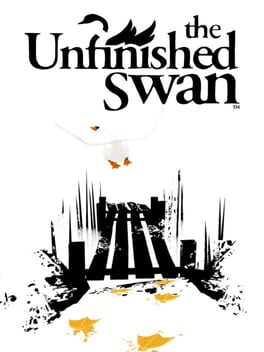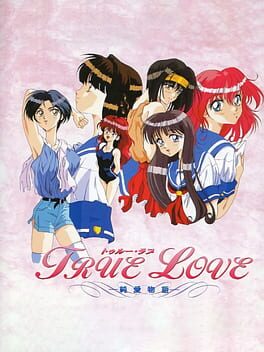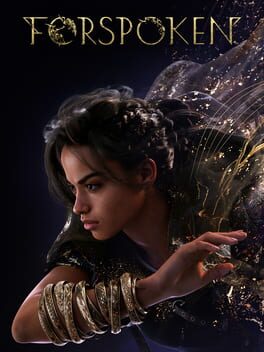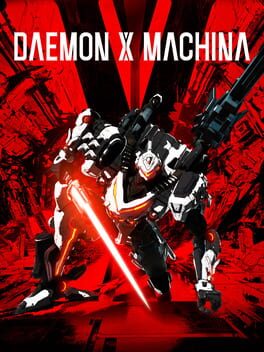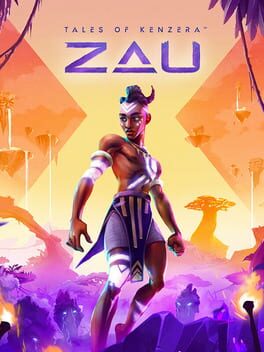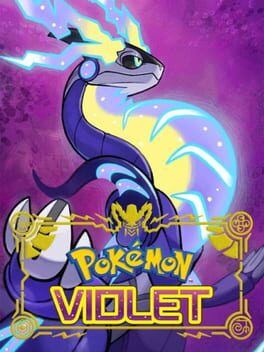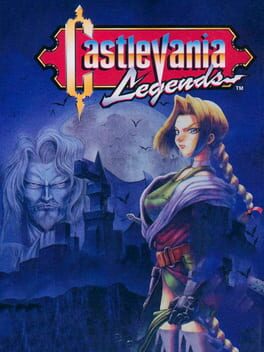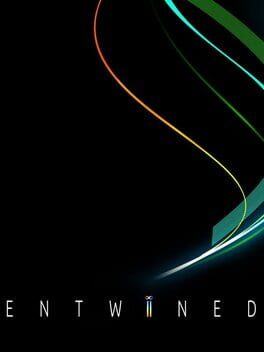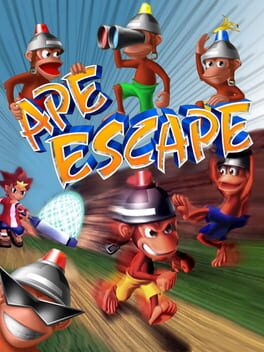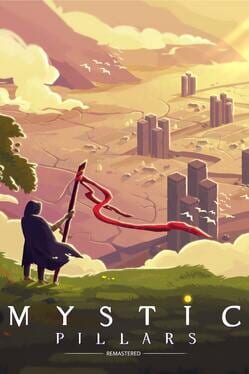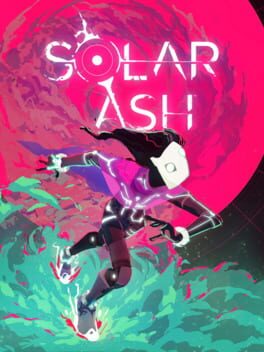tradegood
2014
This game is so inviting with its chirpy music, soft colors, and simple shapes. The way it slowly ramps up the difficulty into a twitchy, precise shooter is fantastic. The high score speedrun/arcade style gameplay works well because there is a purity and simplicity to the game's mechanics. The speed feels right, the jump feels right, hitting enemy shots with your own shot feels satisfying. This is a great game to pick up for 15-odd minutes here and there to chip away at difficult challenges.
2012
In 2024, this game does not have the same impact that it might have during 2012, when there was really nothing quite like on the PS3. Over the last decade, it's no longer a novelty to play with the conventions of video games, color, 3D geometry, etc... and yet this game still feels unique with much of its approach. I finished this game with mixed feelings, because while it is very imaginative and had a lot of clever ideas (including a particularly strong ending), it doesn't feel cohesive. The pacing spends too long with some ideas and fails to really explore some others.
The game opens in a white maze, and as you toss ink you eventually start creating the outlines of a world, which can look striking at different angles. Your sense of place is a mystery so you want to solve that mystery. However, there is not a mystery to be solved. The story is literal and straightforward and the area you walk around in does not really contain much of interest. The collectable balloons are nice but are contextually weird. The areas don't encourage exploration, in fact I think the idea of the first area is to be a bit aimless.
The next area is the longest of the game, and you can see everything laid out in front of you. The puzzles are not really there to challenge you, and after a while it started feeling tedious to me to follow the prescribed path around the zone. There are flashes of things being interesting, such as when you first get access to the weeds, but the third area is where things really fell off for me. They went in another new direction by having a dark area and turned into a survival game. It was not really what I expected or wanted out of this particular game. Then in the final part of the level unlock the new mechanic, to create platforms. It felt exciting until you discover that you're basically just building the same staircases everywhere and it's all over soon.
The final chapter surprised me with how suddenly everything ended, but I do think they made some good creative choices in telling the story from the King's perspective. It's just a shame that I was not invested in the story at all by that point. It's written as a children's story, and so there's not a lot to grasp onto there.
I want to make a pun about this game feeling unfinished or sloppy/messy like the ink blots of this game, but I do respect it more than that. Overall, I'm glad I played this, and maybe I'll enjoy it more on a future playthrough but the execution left a bit to be desired.
The game opens in a white maze, and as you toss ink you eventually start creating the outlines of a world, which can look striking at different angles. Your sense of place is a mystery so you want to solve that mystery. However, there is not a mystery to be solved. The story is literal and straightforward and the area you walk around in does not really contain much of interest. The collectable balloons are nice but are contextually weird. The areas don't encourage exploration, in fact I think the idea of the first area is to be a bit aimless.
The next area is the longest of the game, and you can see everything laid out in front of you. The puzzles are not really there to challenge you, and after a while it started feeling tedious to me to follow the prescribed path around the zone. There are flashes of things being interesting, such as when you first get access to the weeds, but the third area is where things really fell off for me. They went in another new direction by having a dark area and turned into a survival game. It was not really what I expected or wanted out of this particular game. Then in the final part of the level unlock the new mechanic, to create platforms. It felt exciting until you discover that you're basically just building the same staircases everywhere and it's all over soon.
The final chapter surprised me with how suddenly everything ended, but I do think they made some good creative choices in telling the story from the King's perspective. It's just a shame that I was not invested in the story at all by that point. It's written as a children's story, and so there's not a lot to grasp onto there.
I want to make a pun about this game feeling unfinished or sloppy/messy like the ink blots of this game, but I do respect it more than that. Overall, I'm glad I played this, and maybe I'll enjoy it more on a future playthrough but the execution left a bit to be desired.
1995
This game offers the player two different voyeuristic experiences. First, is the one the game designers created, where you creep around unlocking suggestive images. Second, is the one that you human behind the keyboard is doing, as you peer into the psyche of the type of person who created or consumed this game 30 years ago.
This is not a very good stat-raising game or dating sim. But it is sort of compelling, despite being very juvenile, aggressively horny, and having a messed up translation. The characters and their actions are often manipulative, creepy, or nonsensical in a way that is not making any kind of statement. The game, like many of its contemporaries, operates on its own game logic about women. This game avoids any attempt at self-reflection it clearly is just targeted at a certain kind of person at a specific place and time, and I think that can be interesting to experience. I would not recommend this game to anyone looking for the traditional things you get out of a game, be it storytelling, challenge, a sense of satisfaction, etc. But instead as an anthropological find, it's interesting.
This is not a very good stat-raising game or dating sim. But it is sort of compelling, despite being very juvenile, aggressively horny, and having a messed up translation. The characters and their actions are often manipulative, creepy, or nonsensical in a way that is not making any kind of statement. The game, like many of its contemporaries, operates on its own game logic about women. This game avoids any attempt at self-reflection it clearly is just targeted at a certain kind of person at a specific place and time, and I think that can be interesting to experience. I would not recommend this game to anyone looking for the traditional things you get out of a game, be it storytelling, challenge, a sense of satisfaction, etc. But instead as an anthropological find, it's interesting.
Freed from the shackles of traditional video game structure, the FF7 team went so far above and beyond that it's hard to fathom. No one is coming to this game without having played the original or Remake, so the heavy lifting in terms of story and characters is already accounted for. The game instead focuses its ambition entirely inward, creating the most expansive and compelling game of the AAA Open World Action-Adventure RPG genre -- by embracing Final Fantasy 7 to the highest extent.
They took the winning formulas of FFVII Remake's battle system, and overlayed 100 hours worth of quests, minigames, and exploration that consistently surprises and delights. While some elements may feel a little like chores, it never feels compulsary (unless you plan to 100% the game). Instead all of this adds up to constant new experiences that add color to the world. Even just walking through a new zone, seeing all of the unique assets created for the game makes you feel like you're feasting on the most premium digital world ever created. The most impressive thing about this is that the team didn't need to do any of this. They could have had a strict chapter structure like Remake with smaller cities a faux open world, and we all would have accepted that. But instead they wanted to make something vast and worthy of the ambition of a Final Fantasy Game. It's not a perfect game, but even when things don't quite works.... it works! It's the most imperfect game I would say is a 10/10.
Of course having such a big game take place in the first half of the second act of FF7, the story's stakes and character development is limited by default. There are of course plot twists and the big question everyone is wondering about what will happen to Aerith. It was obviously a challenge to keep a sense of forward momentum and keep the big conflict at the top of mind, but I think they did succeed, even when they made choices to delay some plot points. There is a lot of repetition but still feels well paced.
Part 3 still has a tall task ahead of itself, especially with the ways that this game raises the stakes above Remake. However I do have faith and I think we will all look at The FF7 Remake Series as a real pinnacle of long-form storytelling.
They took the winning formulas of FFVII Remake's battle system, and overlayed 100 hours worth of quests, minigames, and exploration that consistently surprises and delights. While some elements may feel a little like chores, it never feels compulsary (unless you plan to 100% the game). Instead all of this adds up to constant new experiences that add color to the world. Even just walking through a new zone, seeing all of the unique assets created for the game makes you feel like you're feasting on the most premium digital world ever created. The most impressive thing about this is that the team didn't need to do any of this. They could have had a strict chapter structure like Remake with smaller cities a faux open world, and we all would have accepted that. But instead they wanted to make something vast and worthy of the ambition of a Final Fantasy Game. It's not a perfect game, but even when things don't quite works.... it works! It's the most imperfect game I would say is a 10/10.
Of course having such a big game take place in the first half of the second act of FF7, the story's stakes and character development is limited by default. There are of course plot twists and the big question everyone is wondering about what will happen to Aerith. It was obviously a challenge to keep a sense of forward momentum and keep the big conflict at the top of mind, but I think they did succeed, even when they made choices to delay some plot points. There is a lot of repetition but still feels well paced.
Part 3 still has a tall task ahead of itself, especially with the ways that this game raises the stakes above Remake. However I do have faith and I think we will all look at The FF7 Remake Series as a real pinnacle of long-form storytelling.
2023
Forspoken is an outstanding game filled with so many good ideas and imagination. It has unique and addictive gameplay that feels intrinsically rewarding. Once you adapt to the game's control scheme, moving through space feels better than second nature, and the wonderfully crafted parkouring animations always feel exciting to pull off. The mix of combat styles adds depth and variety to even easy battles. The open world is gigantic, beautifully rendered, and designed around the game's traversal mechanics. The way that enemies spawn and you the world seamlessly funnels you into different side objectives on the map is well integrated and makes each session with this game feel like you're making great progress.
Of course, the fatal flaw that turned millions off of this game is the tonal mismatch between wisecracking Frey & Cuff and the rather dour, serious dark fantasy world that they inhabit. It is so distracting that it cursed this game to be a flop. This game asks you to get invested in two worlds, the one with the concept, lore, and worldbuilding which feels very well considered. The there's the characters and isekai element that never feels natural, and the banter and lack of compelling character motives is grating. The player is not going to buy into both things because they are so disparate, and you get a constant reminder that your experience is compromised. They were terrified of having too dark of a story so they pulled back. They were terrified of making it too much of a comedy that people wouldn't take this world too seriously so they put some edge on it. The push and pull just doesn't feel artistically consistent and it's distracting.
The narrative also has its ups and its downs. I think that the initial hook of the game is not that strong, and the plot twists a little bit trite, leading to the ultimate twist that was both obvious and so abrupt that I can't really recommend the story on its own merits, or disaggregate it from the dialogue and characters.
But, I don't think these faults really define the game. This game deserves so much more love and appreciation. You can enjoy the scope and ambition that went into this game, and the fresh ideas they came up with. The character designs and landscape is beautiful and filled with nice touches. It's very well considered and we are at a loss that Luminous Productions dissolved after this game, because they had a lot of ideas and skill that wasn't necessarily directed the best way.
At some point, Square Enix knew they had to push this game out the door, so some elements do feel unfinished. You do have this big open world with a lot of procedural content, but without a lot of the personalization that you would want from doing sidequests or running errands for characters. From the middle of the game, it will suddenly rush you to the ending, dumping a lot of levels and new skills on you as the exposition slightly overstays its welcome. The postgame opens up the world even more, but I was not compelled to keep playing. I am comfortable to close the book on Athia, and will always appreciate it as the truly unique experience that it is.
Of course, the fatal flaw that turned millions off of this game is the tonal mismatch between wisecracking Frey & Cuff and the rather dour, serious dark fantasy world that they inhabit. It is so distracting that it cursed this game to be a flop. This game asks you to get invested in two worlds, the one with the concept, lore, and worldbuilding which feels very well considered. The there's the characters and isekai element that never feels natural, and the banter and lack of compelling character motives is grating. The player is not going to buy into both things because they are so disparate, and you get a constant reminder that your experience is compromised. They were terrified of having too dark of a story so they pulled back. They were terrified of making it too much of a comedy that people wouldn't take this world too seriously so they put some edge on it. The push and pull just doesn't feel artistically consistent and it's distracting.
The narrative also has its ups and its downs. I think that the initial hook of the game is not that strong, and the plot twists a little bit trite, leading to the ultimate twist that was both obvious and so abrupt that I can't really recommend the story on its own merits, or disaggregate it from the dialogue and characters.
But, I don't think these faults really define the game. This game deserves so much more love and appreciation. You can enjoy the scope and ambition that went into this game, and the fresh ideas they came up with. The character designs and landscape is beautiful and filled with nice touches. It's very well considered and we are at a loss that Luminous Productions dissolved after this game, because they had a lot of ideas and skill that wasn't necessarily directed the best way.
At some point, Square Enix knew they had to push this game out the door, so some elements do feel unfinished. You do have this big open world with a lot of procedural content, but without a lot of the personalization that you would want from doing sidequests or running errands for characters. From the middle of the game, it will suddenly rush you to the ending, dumping a lot of levels and new skills on you as the exposition slightly overstays its welcome. The postgame opens up the world even more, but I was not compelled to keep playing. I am comfortable to close the book on Athia, and will always appreciate it as the truly unique experience that it is.
2019
If I was ever going to play a mech game, I'm not playing the one by the Souls team, I'm playing the one by the Harvest Moon team!
Mechs in general don't really do much for me, so I was wary that the game might be unapproachable and overcomplicated, but I think this game strikes a pretty good balance for a “casual+” like me. There's also decent mission and landscape variety, and the early missions are fairly short and forgiving. I think using the trigger buttons was a smart way to design the combat of this game, however playing this in handheld mode or with joycons does not feel great. This game feels like it was designed to be sat in front of a screen with a pro controller or with the game’s custom handheld peripheral… not really designed for the vanilla Switch experience.
While this game is generally adequate all around, it struggles to maintain my interest too much or pull me back in after I set it down. The story doesn't have much intrigue. It introduces a ton of characters, so that you can later unlock them as teammates, but as a result you don't really feel connected to any of them. it’s hard to tell what the actual stakes are, and the enemies are undefined AIs without a clear motivation. There are some named enemies but the game has you destroy them at the end of each mission, so it does not feel personal. The progression is also slow and incremental, I don’t feel much different after an hour or two of playing. Overall it’s somewhat disappointing as a RPGish experience, but I’m ok with it being the type of game I can passively absorb over a long period of time, without needing to focus on. This isn’t a game I feel a need to finish or see everything, I can just chip away at if I ever want to jump back into a mech suit.
Mechs in general don't really do much for me, so I was wary that the game might be unapproachable and overcomplicated, but I think this game strikes a pretty good balance for a “casual+” like me. There's also decent mission and landscape variety, and the early missions are fairly short and forgiving. I think using the trigger buttons was a smart way to design the combat of this game, however playing this in handheld mode or with joycons does not feel great. This game feels like it was designed to be sat in front of a screen with a pro controller or with the game’s custom handheld peripheral… not really designed for the vanilla Switch experience.
While this game is generally adequate all around, it struggles to maintain my interest too much or pull me back in after I set it down. The story doesn't have much intrigue. It introduces a ton of characters, so that you can later unlock them as teammates, but as a result you don't really feel connected to any of them. it’s hard to tell what the actual stakes are, and the enemies are undefined AIs without a clear motivation. There are some named enemies but the game has you destroy them at the end of each mission, so it does not feel personal. The progression is also slow and incremental, I don’t feel much different after an hour or two of playing. Overall it’s somewhat disappointing as a RPGish experience, but I’m ok with it being the type of game I can passively absorb over a long period of time, without needing to focus on. This isn’t a game I feel a need to finish or see everything, I can just chip away at if I ever want to jump back into a mech suit.
The story has a lot of heart and the setting, music, and 3D environments are wonderful. The character of ZAU is well thought out and the new abilities to traverse the map feel like meaningful upgrades. Having two very distinct fighting styles – a melee and a ranged option you can flip back and forth between – feels great. However, it does fall a little short as a metroidvania, being very linear, the levels don’t reward backtracking , and there’s not much of a point completing the challenges to get passive runes, unless you are just doing it to challenge yourself. The more time you spend in this game, the more you can see where corners are cut and the game feels a little unnecessarily long and repetitive.
You definitely first notice that the enemies don’t have much variety, which did not really bother me, until certain zones where you get locked into long fights with many waves of the same enemies requiring little thought to actually defeat them. There are only about 5 enemy types so once you come up with a strategy for them, you can just do that every time and hope the enemy doesn’t get a lucky hit. The boss fights provided a bit more of a challenge, but some of that challenge was unfortunately being unable to see exactly what is happening on screen due to how many particle effects are flying around.
Another big issue with this game is that it was sometimes unresponsive for me. Pressing buttons didn’t always do what I wanted, the camera would lag behind in a frustrating way, and the detection of something like the arrow swing would sometimes miss entirely. It led to a lot of frustration, particularly in some of the late game challenge sections and chase sequences. I really enjoyed the platforming for about 80% of the game, but I think the polish of the early game abilities is not present for the stuff you do at the end of the game.
The story was well delivered, and though it wasn’t the most unique story, I can appreciate how it was told in a way that reflects the creator’s cultural background. The story had the most thought and clarity in this game, and I think it’s very admirable. I think this team definitely has the ability to keep improving on all aspects and I look forward to seeing what they do next.
You definitely first notice that the enemies don’t have much variety, which did not really bother me, until certain zones where you get locked into long fights with many waves of the same enemies requiring little thought to actually defeat them. There are only about 5 enemy types so once you come up with a strategy for them, you can just do that every time and hope the enemy doesn’t get a lucky hit. The boss fights provided a bit more of a challenge, but some of that challenge was unfortunately being unable to see exactly what is happening on screen due to how many particle effects are flying around.
Another big issue with this game is that it was sometimes unresponsive for me. Pressing buttons didn’t always do what I wanted, the camera would lag behind in a frustrating way, and the detection of something like the arrow swing would sometimes miss entirely. It led to a lot of frustration, particularly in some of the late game challenge sections and chase sequences. I really enjoyed the platforming for about 80% of the game, but I think the polish of the early game abilities is not present for the stuff you do at the end of the game.
The story was well delivered, and though it wasn’t the most unique story, I can appreciate how it was told in a way that reflects the creator’s cultural background. The story had the most thought and clarity in this game, and I think it’s very admirable. I think this team definitely has the ability to keep improving on all aspects and I look forward to seeing what they do next.
2022
I'm a casual pokemon player but a big Dragon Quest and classic JRPG fan, and in 2022 when I first played this game, I was not prepared for it to deviate from the formula as much as it did. I never wanted an online, open world 3D platform exploration game. I am a fan of the sense of progression, random encounters, and level design/pacing that the original games had. So jumping into this world I thought the tradeoff was a ripoff. I thought this game has terrible pacing with long, drawn out and poorly written story sections. The exploration zones don't signpost that you're getting overpowered, and thus trivializing a lot of the game. Even the excitement of seeing new monsters is spoiled when you've already caught higher level versions of their evolutions. And of course the glitches, slowdown, low-res textures, aliasing, and animations going 10 frames per second were a big distraction that added to the friction of getting invested in this game. It felt like Pokemon just wasn't special and wasn't moving in the direction I wanted it to. I thought it was below average, 4/10.
Now, I'm at peace with what Pokemon has become. Going through that experience two years ago changed my thought process coming back to it. I was now prepared for some of the worse offenses of the game, and it allowed me to find the fun more easily. Rather than treating this as something a game to actively play, I mostly just played it while traveling and in hotel rooms and doing other stuff and it hit the spot.
The technical issues feel much less intrusive the second time around, despite having a lot of the same issues. I think textures may have been improved, because I did find myself noticing more details in how the monsters look and appreciating their designs more. While I wish the open world was more curated, I see the appeal to it now, and it seems like the areas are more interesting than I originally gave them credit for. Having seen the map, I now knew where to keep the level scaling to not snowball. All 3 questlines and the post game story still feels like some of the worst writing in video games (due to how much these characters say to each other without saying anything of interest), but now I made less effort to engage with that stuff.
This game doesn't live up to the standards I had for Pokemon in 2022, but my standards have started to adapt to what Pokemon is beocming. I think if they iterate on this new formula with more imagination and the learnings from what went wrong with this Scarlet/Violet, the next game could be something very special, and could be an exciting new path for the series.
Now, I'm at peace with what Pokemon has become. Going through that experience two years ago changed my thought process coming back to it. I was now prepared for some of the worse offenses of the game, and it allowed me to find the fun more easily. Rather than treating this as something a game to actively play, I mostly just played it while traveling and in hotel rooms and doing other stuff and it hit the spot.
The technical issues feel much less intrusive the second time around, despite having a lot of the same issues. I think textures may have been improved, because I did find myself noticing more details in how the monsters look and appreciating their designs more. While I wish the open world was more curated, I see the appeal to it now, and it seems like the areas are more interesting than I originally gave them credit for. Having seen the map, I now knew where to keep the level scaling to not snowball. All 3 questlines and the post game story still feels like some of the worst writing in video games (due to how much these characters say to each other without saying anything of interest), but now I made less effort to engage with that stuff.
This game doesn't live up to the standards I had for Pokemon in 2022, but my standards have started to adapt to what Pokemon is beocming. I think if they iterate on this new formula with more imagination and the learnings from what went wrong with this Scarlet/Violet, the next game could be something very special, and could be an exciting new path for the series.
2024
I just rolled credits, and knowing there are more secrets to wrap up after finishing the game, I am really excited to dig in even further. I was a little skeptical jumping in and wasn't really sure if I would want to thoroughly explore it all, but it won me over. It is very satisfying to discover new things in the areas you have been, new ways to use your tools, and your platforming persistence is rewarded. While it can get difficult it's surprisingly forgiving as long as you have patience.
It can’t be understated how great Animal Well’s art style, lighting, shaders, and visual composition fits together so well. The atmosphere is fantastic and I actually really appreciate just about everything this game to set the mood and tone. It feels as threatening, isolated, and alien as a Metroid game, but as you progress the unique aspects to the areas reveal themselves.
It's very hard to put down without thinking about the many unsolved threads you need to go back and tie up. Wonderful experience.
It can’t be understated how great Animal Well’s art style, lighting, shaders, and visual composition fits together so well. The atmosphere is fantastic and I actually really appreciate just about everything this game to set the mood and tone. It feels as threatening, isolated, and alien as a Metroid game, but as you progress the unique aspects to the areas reveal themselves.
It's very hard to put down without thinking about the many unsolved threads you need to go back and tie up. Wonderful experience.
1997
For someone who grew up loving Metroid 2, this game scratches a similar itch. It translates the original Castlevania's gameplay to the Gameboy pretty well. I played this on the Switch emulator, where moving around feels smooth and having the ability to rewind is very nice. I can imagine on original hardware it is a much different experience -- the countdown clock, the dead ends, the way it would look without backlight, and the way enemies respawn just outside the small screen are punishing. But modern hardwar and rewind makes sometimes unfair fights more tolerable. This is not a game that's meant to be played in one shot like games are played today - you're supposed to be putting it down and coming back, finding secrets, and writing down passwords to come back later. But if you don't have time for that and are willing to bend the rules a bit for modern convenience, it can be a a very fun 90 minute adventure.
The first few zones are pretty easy, and if you use the powerups, you can get past most obstacles pretty easily. The game gets a little more abrasive as it goes and you'll take some unavoidable hits due to the screen size. The ropes are an understandable platforming downgrade from stairs, having it kill you immediately when you fall down is an unfortunate reminder of the times. Having secrets to discover is great, and I like the way they handle the upgrades. However the story, the appearance of Alucard, and the dialogue isn't much of anything so definitely don't play this game if you're looking for a story. But if you're looking for a game with good vibe to hang out with, you could do a lot worse than this one.
The first few zones are pretty easy, and if you use the powerups, you can get past most obstacles pretty easily. The game gets a little more abrasive as it goes and you'll take some unavoidable hits due to the screen size. The ropes are an understandable platforming downgrade from stairs, having it kill you immediately when you fall down is an unfortunate reminder of the times. Having secrets to discover is great, and I like the way they handle the upgrades. However the story, the appearance of Alucard, and the dialogue isn't much of anything so definitely don't play this game if you're looking for a story. But if you're looking for a game with good vibe to hang out with, you could do a lot worse than this one.
2014
Entwined is a game that claims to have artistic ambitions, but it fails to deliver on anything past the elevator pitch. The story of the game has to be explained to you and is far less as deep as it sounds. During its 90 minute runtime, it does not evolve or go anywhere, and it overall fails to deliver any emotion to the player. I think the template for this kind of game is pretty simple, even though there aren't real "characters" you could use the gameplay to demonstrate the characters becoming in sync for the first time, have them drift apart, and then reconnect at the end… but instead every one of the nine lives that these characters has is exactly the same and does not attempt to tell the story mechanically.
I feel bad coming down too hard on the gameplay, because there is a warning before starting it that the PS5 version is not optimized, and it’s best played on PS4. But it is imprecise and frustrating when you miss inputs. The game is a bit too long for one sitting to demand that the player constantly moves the sticks exactly, and in the later stages I started losing because my fingers were getting tired, rather than any sort of mechanical challenge. The challenges they do add feel bad, for example in life 8 you can’t forsee that it converges at green in advance because the orange and blue inputs are much bigger. The gameplay is repetitive and it’s not the type of game that you can improve upon. It ultimately feels like a less complex guitar hero or rhythm game but without music cues. The presentation still holds up 10 years later, but the game doesn’t have a compelling reason to stick with it.
I feel bad coming down too hard on the gameplay, because there is a warning before starting it that the PS5 version is not optimized, and it’s best played on PS4. But it is imprecise and frustrating when you miss inputs. The game is a bit too long for one sitting to demand that the player constantly moves the sticks exactly, and in the later stages I started losing because my fingers were getting tired, rather than any sort of mechanical challenge. The challenges they do add feel bad, for example in life 8 you can’t forsee that it converges at green in advance because the orange and blue inputs are much bigger. The gameplay is repetitive and it’s not the type of game that you can improve upon. It ultimately feels like a less complex guitar hero or rhythm game but without music cues. The presentation still holds up 10 years later, but the game doesn’t have a compelling reason to stick with it.
2013
140 is the type of game that feels timeless and comes out of the gate as a very complete and succinct experience. The presentation does a lot with very little. A large part of the appeal is that it is so simple -- it uses geometric shapes, the color palette, music and audio cues to great effect. There's challenge, but it's pretty forgiving with lots of checkpoints. If you meet the game on its terms without setting much expectations you'll have a great time. And it's the sort of experience that you can have 10 years between playing and it still resonates the same way.
1999
Playing the game for the first time in 2024 is an interesting experience. The biggest barrier to entry is the control scheme, it's experimental and does not quite feel natural with the way that things have evolved. However, you can adjust to it quickly and the skill barrier is low enough at the start that it's not really a problem in the early game. I hesitate to call it good, but it's so different that it's unfair to criticize it just because 3D gaming has gone in a wildly different direction.
Some of the tools are a bit difficult to use, but the game has generous amounts of apes in each level and does not make you catch all of them to progress, so you can tailor your experience pretty well. I think it is fun to hunt down these apes, and I really wish there were more games with this kind of objective. It's wild that a game that is so immediately fun and interesting doesn't really have imitators.
I am not the type to want to collect everything, but the joy of seeing the apes doing funny, unique things really pushed me along to want to see "just one more level". After about 90 minutes I definitely got my fill on this game and am happy to put it down for a bit. Now that I have a feel for it, I'm sure I'll be able to jump back in any time.
Some of the tools are a bit difficult to use, but the game has generous amounts of apes in each level and does not make you catch all of them to progress, so you can tailor your experience pretty well. I think it is fun to hunt down these apes, and I really wish there were more games with this kind of objective. It's wild that a game that is so immediately fun and interesting doesn't really have imitators.
I am not the type to want to collect everything, but the joy of seeing the apes doing funny, unique things really pushed me along to want to see "just one more level". After about 90 minutes I definitely got my fill on this game and am happy to put it down for a bit. Now that I have a feel for it, I'm sure I'll be able to jump back in any time.
I understand this started as a mobile game, but contextualized into a console game, this is not worth sitting down to play. While it's accurate to say this is a puzzle game based on single-player mancala with 100 levels and a visual novel element, conceptually the puzzle at the core of this game is weak and the presentation does not do it favors. Most puzzles are quite easy, and when you solve a difficult one, it feels less like you discovered the pattern to intentionally solve it, and more like you brute forced it based on trial and error. For the harder puzzles counting things out is less appealing than just trying different combinations.
This game feels designed to be played in short bursts rather than 50 puzzles in a row, however the long-winded story segments and gentle music doesn’t give that impression. It invites you to take the game slowly in a longer session, which reveals how repetitive it is. The story does not add to the game, and despite the presence of a “lore” button, it fails to create entertaining context around what you’re doing. The UI elements could use some improvement, just based on colors and small arrows it's hard to tell what direction arrows are going and having gems light up on the pillars becomes less helpful for sight-reading the puzzle as it gets more complex.
This game feels designed to be played in short bursts rather than 50 puzzles in a row, however the long-winded story segments and gentle music doesn’t give that impression. It invites you to take the game slowly in a longer session, which reveals how repetitive it is. The story does not add to the game, and despite the presence of a “lore” button, it fails to create entertaining context around what you’re doing. The UI elements could use some improvement, just based on colors and small arrows it's hard to tell what direction arrows are going and having gems light up on the pillars becomes less helpful for sight-reading the puzzle as it gets more complex.
2021
Solar Ash is a beautiful and very well realized game about exploring and moving through space. The game feels like it was built upon its skating and gravity mechanics, with some very solid platforming, big boss fights, and a good number of hidden collectables. It also shows off a fantastic sense of vertical scale every time you reach a new area, you're a given vast establishing shots showing the entire area that you will explore. Each zone feels very distinct and there are memorable challenges in each of them.
But unlike Hyper Light Drifter, this game's story does not speak for itself, instead it's delivered through conversations and data logs which I found hard to get into. The central conflict between Echo and Rei is visually striking and mysterious. The imagery is all we really need, I don't think this game needed to walk the player through the story of regret in such a wordy way. Perhaps it is an unfair standard to compare it to the developer's first game, but I think they could have told this story entirely environmentally with as much focus on the boss fights as they had.
Having lore and NPC stories doesn't really drag the game down much, but it adds up with some other things. The game's full potential is held back a bit by the combat, certain instances of unfair timing, and occasional jank that's to be expected from such an ambitious 3D platformer. Once you've seen an area and solved its puzzles it can be a little tedious to backtrack through them or have to repeat tricky sections. It's not a perfect game but it's one that is definitely worth your time and one that I look at fondly and will probably return for extra challenges in the future.
But unlike Hyper Light Drifter, this game's story does not speak for itself, instead it's delivered through conversations and data logs which I found hard to get into. The central conflict between Echo and Rei is visually striking and mysterious. The imagery is all we really need, I don't think this game needed to walk the player through the story of regret in such a wordy way. Perhaps it is an unfair standard to compare it to the developer's first game, but I think they could have told this story entirely environmentally with as much focus on the boss fights as they had.
Having lore and NPC stories doesn't really drag the game down much, but it adds up with some other things. The game's full potential is held back a bit by the combat, certain instances of unfair timing, and occasional jank that's to be expected from such an ambitious 3D platformer. Once you've seen an area and solved its puzzles it can be a little tedious to backtrack through them or have to repeat tricky sections. It's not a perfect game but it's one that is definitely worth your time and one that I look at fondly and will probably return for extra challenges in the future.

